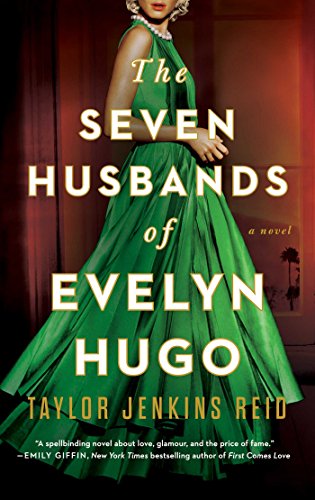
"Life doesn’t get easier simply because it gets more glamorous."
A riveting tale of glamour, fashion, stardom, struggle and the birth of a legend. As engaging as the fictional life of the title character, The Seven Husband of Evelyn Hugo describes a fictional star in such complex detail that it's impossible not to wish that Evelyn were real to be worshipped... and possibly judged.
PLOT
Journalist, Monique is assigned to interview Evelyn Hugo since she is selling her more iconic gowns for charity and has specifically requested for Monique to lead this conversation. Upon arrival, Evelyn reveals her agenda: she is not willing to give an interview to Monique but to reveal the story of her life which she hopes Monique will turn into a biography.
Then, we venture into Evelyn Hugo's past and struggles to become a star. She had to marry her first husband in order to enter into the Hollywood scene, and later dumped him for the man who would become her second husband who would physically abuse her and the only man she felt she truly fell in love with beside the love of her life who would appear later on. Then, a rock star she marries to stop her rumors of being homosexual.
The fourth marriage with a man she uses only to continue having an affair with Celia St. James, the real love of her life. The fifth with Harry Cameron, her best friend and producer, also homosexual. The sixth with a man she hoped would finally revive some feelings inside her when he only worshipped her persona and not her true self. And finally, Robert Jamison whom she would marry to spend the rest of her life with Celia (Robert is Celia's brother).
Evelyn's life is filled with glamour and struggle. Evelyn is power-hungry and decided to do whatever it takes to get fame, and when she finally gets it, she finds herself at a crossroad since she has to decide between success or love. She falls in love with co-star, Celia St. James; however, by the time the novel is set, around 1950-1990, it's not possible for the two of them to show their love in public. Both are rising stars, Evelyn is evocative and stunning while Celia is beautiful but also a great actress, but they have to hide and Evelyn gets involved in some of her marriages only to cover for their affair.
However, as Evelyn recounts the story of her life to Monique, she reveals she regrets not having had the courage to abandon her glamorous life to spend her life with the only woman she ever truly loved unconditionally and that could not forget after she had died.
STRUCTURE
The novel begins taking into consideration Monique's perspective to later switch to Evelyn's with flashbacks that take us back to her real motivations and struggle since nowadays, Evelyn is a legend, but her story gives us context on what she had to go through to get what she wanted (and that eventually, she would have exchanged to stay with those she loved).
THEMES
Surprisingly (given the original premise of the novel), homosexuality is one of the main topics of the novel, this because of the constant internal battle of Evelyn and Celia to come out of the closet and accept the consequences or stay hidden performing multiple pirouettes to keep the appearances.
The sacrifices we make to achieve our dreams is another important topic as Evelyn must sacrifice not only her love life but also some of her dignity by using her charm (and sometimes her body) to yield to men's desires to continue getting recognition.
The power of friendship and love is an essential part of the novel. Harry and Celia become the most influential people in Evelyn's life, those who stay by her side despite the ups and downs.
ABOUT THE ENDING:
Having asked Monique as the interviewer because Evelyn wanted to reveal to Monique she somewhat damaged Monique in a way she never expected (by setting up Monique's father as the responsible in a car accident where Harry was driving under the influence) was not really a move I expected and I did not particularly loved though I understand it.
Letting Evelyn Hugo die as Monique struggles on what to do with the information provided was a great touch for the ending as Monique finally presents the article revealing Evelyn Hugo's secret: The seven husbands are not important since she only wanted a wife: Celia St. James.
CHARACTER: 8.5/10 (never really got the point of Monique's husband)
PLOT DEVELOPMENT: 10/10
THEMES: 10/10
GRADE: Must-Read, amazing contemporary literature.

Comentarios
Publicar un comentario